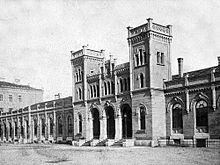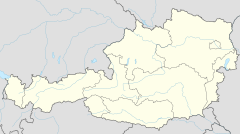Linz Hauptbahnhof
Linz Hauptbahnhof or Linz Central Station is a railway station in Linz, the third largest city in Austria, and capital city of the federal state of Upper Austria.[1] Opened in 1858, the station is the centrepiece of the Linz transport hub. It forms part of the Western Railway, and is also a terminus of the Pyhrn Railway, the Summerauer Railway, and the Linzer Lokalbahn (LILO). The station is owned by the Austrian Federal Railways (ÖBB); train services are operated by the ÖBB and the LILO. With 40,800 passengers daily in 2018/2019, it is the busiest station in Austria outside of Vienna, and the 7th-busiest overall.[2]
Linz Hauptbahnhof is situated in Bahnhofplatz, near the southern edge of the city centre.
History
[edit]
The first Linz central station building was completed in 1858, to coincide with the arrival of the Empress Elisabeth Railway company's Western Railway from Vienna.
The station was rebuilt from 1936 by the Nazis - being the closest city to Adolf Hitler's birthplace - in a severe modernist style characterized by a reinforced concrete frame, high ceilings, and elongated windows.[3] But by the time of its completion, Linz had already been designated one of five "Führer cities" where complete remodelling would take place. The site of the station in the remodelling plan was designated as the site of the Führermuseum, with the station to be moved four kilometres (2.5 mi) to the south at the opposite end of a new main boulevard.[4][5] However, these remodelling plans never came to fruition, and with the rebuilt station building damaged by Allied bombing during World War II, the station was rebuilt for a second time between 1949-1955 in a contemporary sober style.[3]
By the end of the twentieth century, it was no longer appropriate to the increasing requirements of contemporary public transport. Between 2002-2004, the rebuilt station building was completely replaced with a new building designed by Wilhelm Holzbauer. This redevelopment also added the Terminal Tower skyscraper as part of a mixed-use complex.[3]
Station building
[edit]The present station building is structured in three levels. The main entrance is at ground level, next to the taxi rank, and also provides the connection to the station's bus terminal.

The bus terminal is used by Postbuses and some bus and trolleybus routes operated by Linz Linien. It is also used by the Welser company's regional buses, which connect Linz with the neighbouring communities of Traun and Ansfelden.
The railway platforms are accessible via the intermediate level of the building. Here, alongside the ÖBB ticket windows, information services, and the ÖBB club lounge, are shops and restaurants.
In the basement, there are stops for all three lines of the Linz tramway network, and an underground parking garage.
Due to its short transfer routes, large size and bright ambience, the building has repeatedly won the Verkehrsclub Österreich's award for the most popular and beautiful railway station in Austria, ahead of the central stations at Klagenfurt, Wiener Neustadt, and Wels.
Train services
[edit]The station is served by the following services:
- Westbahn services Salzburg - Attnang Puchheim - Wels - Linz - Amstetten - St Pölten - Vienna[6]
- Intercity Express services (ICE 91) Hamburg - Hanover - Kassel - Nürnberg - Passau - Linz - St Pölten - Vienna - Vienna Airport
- Intercity Express services (ICE 91) Dortmund - Essen - Düsseldorf - Cologne - Koblenz - Frankfurt - Nürnberg - Passau - Linz - St Pölten - Vienna - Vienna Airport
- RailJet services Zürich - Innsbruck - Salzburg - Linz - St Pölten - Vienna - Győr - Budapest
- RailJet services Munich - Salzburg - Linz - St Pölten - Vienna - Győr - Budapest
Platforms
[edit]As at 2015, Linz Hauptbahnhof had 14 operating station platforms, of which platforms 21 and 1 were allocated to Linzer Lokalbahn trains.
The platforms are of the latest design, to correspond with the requirements of the ÖBB's Bahnhofsoffensive. All are equipped with elevators or escalators. All platforms, except platform 22 are through platforms.
Platforms 21 and 22 are primarily used by the S-Bahn lines.
Interchange
[edit]Following the Bahnhofsoffensive, some changes were visible in public transport interchange at Linz Hauptbahnhof.
Tram station
[edit]
Until 2004, the Hauptbahnhof was served only by line 3 of the Linz tram system. Lines 1 and 2 ran along the Wienerstraße, a short distance away. The Wienerstraße route has now been relocated underground between Goethekreuzung and Herz Jesu Kirche. By that new route, lines 1 and 2 now join line 3 in serving the Hauptbahnhof. The former above ground tram route between Blumauerplatz and Herz Jesu Kirche had been removed by 2009, and the streets were resurfaced. Thus, nothing now remains of the old route.
The Hauptbahnhof tram stop is now 86 m (282 ft) long and has space for 2 Cityrunner trams. Both ends of the station are fitted with reversing loops.
Bus terminal
[edit]In 2004, the bus terminal was built east of the Hauptbahnhof. The bus station is below the county offices (regional service centre) and is at ground level. In the bus terminal there are three long bus platforms, where the Linz AG Linien, Postbus und Wilhelm Welser Traun buses all stop. The bus terminal is a total of 200 m (656 ft) long and 50 m (164 ft) wide.
See also
[edit]References
[edit]- ^ ÖBB travel portal: Stations with Luggage lockers "Upper Austria: Linz Hauptbahnhof, Wels Hauptbahnhof, .. Salzburg Hauptbahnhof, ..Graz Hauptbahnhof, Leoben Hauptbahnhof, ...Carinthia / East Tyrol: Klagenfurt Hauptbahnhof, Villach Hauptbahnhof, Tyrol: Innsbruck Hauptbahnhof, .. "
- ^ "ÖBB Facts & Figures 2019" (PDF). ÖBB Press. 2019. p. 40. Retrieved 2021-10-07.
- ^ a b c "Linz - Kultur - Denkmäler: Hauptbahnhof" (in German). City of Linz. Retrieved 2011-04-28.
- ^ Plaut (1946)
- ^ "Hitler's Museum", Intelligent Television, retrieved 13 December 2008
- ^ "WESTbahn".
External links
[edit]![]() Media related to Linz Hauptbahnhof at Wikimedia Commons
Media related to Linz Hauptbahnhof at Wikimedia Commons
- Linzer Lokalbahn - official site (in German)





